
14 March 22
Right Now the Small Donors are the Only Donors
At this point the only donors coming through are the very small donors. We need some larger donors to match that effort.
That would make a huge difference now.
Marc Ash
Founder, Reader Supported News
Sure, I'll make a donation!
If you would prefer to send a check:
Reader Supported News
PO Box 2043 / Citrus Heights, CA 95611
Follow us on facebook and twitter!
Update My Monthly Donation

14 March 22
Live on the homepage now!
Reader Supported News
WAVING HANDS FOR DONATIONS: Super important to get these few donations in. The dollar figures are by no means daunting. Your donation has made the difference in building RSN from day one. Invest in freedom support RSN with a donation. Thank you sincerely.
Marc Ash • Founder, Reader Supported News
Sure, I'll make a donation!
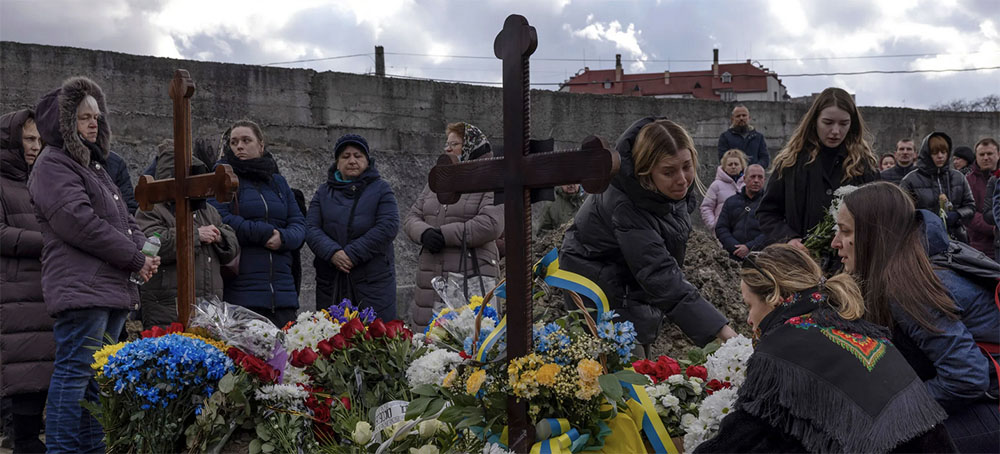
Philip Gourevitch | Is It Time to Call Putin's War in Ukraine Genocide?
Philip Gourevitch, The New Yorker
Gourevitch writes: "In international law, genocide has nothing explicitly to do with the enormity of criminal acts but, rather, of criminal intent."
In international law, genocide has nothing explicitly to do with the enormity of criminal acts but, rather, of criminal intent.
"We have to call this what it is,” Volodymyr Zelensky said, late last month, a few days after Vladimir Putin had ordered the invasion and conquest of Ukraine. “Russia’s criminal actions against Ukraine show signs of genocide.” President Zelensky, who lost family members during the Holocaust, and who also happens to have a law degree, sounded suitably cautious about invoking genocide, and he called for the International Criminal Court in The Hague to send war-crimes investigators as a first step. But such investigations take years, and rarely result in convictions. (Since the I.C.C. was established in 1998, it has indicted only Africans; and Russia, like the United States, refuses its jurisdiction.) The only court that Zelensky can make his case in for now is the court of global public opinion, where his instincts, drawing on deep wells of courage and conviction, have been unerring. And by the end of the invasion’s second week—with Putin’s indiscriminate bombardment of civilian targets intensifying, and the death toll mounting rapidly; with more than two and a half million Ukrainians having fled the country, and millions more under relentless attack in besieged cities and towns; and with no end in sight—Zelensky no longer deferred to outside experts to describe what Ukrainians face in the most absolute terms. “I will appeal directly to the nations of the world if the leaders of the world do not make every effort to stop this war,” he said in a video message on Tuesday. He paused, and looking directly into the camera, added, “This genocide.”
Genocide, the word and the idea, is colloquially understood to describe an effort to exterminate members of a definable identity group through targeted killings. Because the best-known cases involve staggering death tolls—the extirpation of Native Americans and Indigenous peoples in the United States and Canada, of Armenians under the Ottomans, of European Jews in the Holocaust, of Rwandan Tutsis at the hands of Hutu Power in 1994—genocide is often assumed to mean mass slaughter, and to have drastic demographic consequences. But, in international law, genocide has nothing explicitly to do with the enormity of criminal acts. Rather, according to the 1948 United Nations Convention on the Prevention and Punishment of the Crime of Genocide, it is defined by the enormity of criminal intent:
Genocide means any of the following acts committed with intent to destroy, in whole or in part, a national, ethnical, racial or religious group, as such: (a) Killing members of the group; (b) Causing serious bodily or mental harm to members of the group; (c) Deliberately inflicting on the group conditions of life calculated to bring about its physical destruction in whole or in part; (d) Imposing measures intended to prevent births within the group; (e) Forcibly transferring children of the group to another group.
By this standard, Putin’s war of obliteration comes readily into focus as genocidal, if not—to date, anyway—as comprehensive genocide. His apparent objective is to extinguish Ukraine as an independent nation, and to subsume it and its surviving population into Russia, where he claims it naturally belongs. As he prepared to attack, massing his forces on Ukraine’s borders, and pretending to engage in diplomatic brinkmanship, he seemed to imagine that the threat of overwhelming force might inspire Ukraine’s leaders to capitulate and surrender preëmptively to his diktat. In early February, after President Emmanuel Macron, of France, flew to Moscow to try to reason with him, they held a joint press conference in which Putin said, as if addressing Ukraine directly, “Like it or not, take it, my beauty.” The line was immediately recognized as a reference to a luridly menacing song about necrophiliac rape by the punk band Red Mold. The Kremlin and its press organs airbrushed the taunt out of the official transcripts. But Putin had made himself clear: he viewed Ukraine as a corpse, and would have his way with it.
In announcing the start of the war, Putin spoke dismissively of Ukraine as a historical fiction, denying its sovereign existence, and portrayed his invasion, absurdly, as a sort of humanitarian mission to “de-Nazify” the place, to protect its people from humiliation and genocide at the hands of their own popularly elected leaders, and to bring those leaders to trial. Putin’s world-upside-down framing treated questions of genocide and war crimes, as well as of democracy and accountability, as make-believe, and therefore ridiculous; and it gave off a strong whiff of the propaganda tactic known as “accusation in a mirror,” in which a speaker accuses his prospective victims of plotting to do to him what he is plotting to do them. As Jen Psaki, the White House press secretary, recently tweeted, “Russia has a track record of accusing the West of the very violations that Russia itself is perpetrating.” Zelensky put it more succinctly: “If you want to know what Russia is planning, look at what Russia is accusing others of planning.”
Putin evidently anticipated that his military juggernaut would meet little resistance, swiftly take Kyiv, and replace Zelensky’s government with an obliging puppet regime. On the third day of the war, even as his forces began to show their weakness, and Ukraine’s began to show their strength, an essay prematurely hailing Putin’s victory in Kyiv, and the dawn of a new world order, appeared on a Kremlin-controlled news platform. It was promptly taken down, but not before being preserved, and, while it cannot be regarded as direct evidence of Putin’s intent, its rhetoric, which reads in parts as if it were repurposed from the archives of the Third Reich, suggests the attitude among his propagandists:
Vladimir Putin has assumed, without a drop of exaggeration, a historic responsibility by deciding not to leave the solution of the Ukranian question to future generations. After all, the need to solve it would always remain the main problem for Russia. . . . Now this problem is gone—Ukraine has returned to Russia. . . . Russia has not only challenged the West, it has shown that the era of Western global domination can be considered completely and finally over.
Meanwhile, in reality, the prospect of Russian glory looks as diminished as the exchange rate of the ruble. That increases the risk of genocidal atrocities. Putin has no apparent exit strategy; and the worse the war has gone for him, the worse he has made it for Ukraine, raining hellfire on its civilian infrastructure, in what appears to be a determination to reduce it, as his forces previously did in parts of Chechnya and Syria, to lifeless rubble. By his own account, Putin’s fight is, above all, against humiliation, and that is a fight he’s losing badly. The war is only in its third week, and he has repeatedly signalled that he is prepared to use his nuclear arsenal, a threat so grave from a man so given to the use of annihilating force that it would be a folly to assume that he’s bluffing.
Zelensky has spent his days under attack convincingly presenting himself and Ukraine to the rest of the world as standing the ground for the collective interests and future of sovereign self-determination against despotism. He has been received with an immediate and extraordinary unanimity of solidarity and commitment: arms, intelligence-sharing, aid, and crushing economic sanctions against Russia. But that has not been enough to spare the Ukrainians, and Zelensky has now taken to using his Kyiv bunker as a bully pulpit to try and shame the world into joining his fight by imposing a no-fly zone over Ukraine. Russia, he says, is alone to blame for the war and its horrors, but he insists that the rest of the world—and here, he singles out the NATO powers—shares responsibility.
“If the world stands aloof, it will lose itself. Forever,” Zelensky said, on Tuesday. “Because there are unconditional values. The same for everyone. First of all, this is life. The right to life for everyone.” Then, on Wednesday, after Russia bombed a maternity hospital in Mariupol, he asked, “How much longer will the world be an accomplice ignoring terror? Close the sky right now!” Last week, the mayor of Kharkiv and deputy mayor of Mariupol also described Putin’s campaign as genocide, and Zelensky said that the hospital attack was “the final proof—proof that genocide of Ukrainians is taking place.” He called out Europeans collectively, and said: “You saw. You know.”
It is true that we are all aware of what’s happening: the systematic assault on civilians, on hospitals, on refugee-evacuation routes, on holy places and libraries and Holocaust memorials, and the shrugs and denial from the Kremlin, whose only public acknowledgment of the horror has been to make it a crime punishable by fifteen years in prison to speak of what’s happening as “war” or “invasion.” Many of the NATO countries that Zelensky is seeking to draw into the war have ignored genocides and other mass atrocities in the past, and a few had a hand in them. But none of the countries that Zelensky is appealing to now fails to recognize the enormity of either Putin’s actions or his intent, or sees any advantage in aiding or abetting them. Rather, it is Zelensky, in this instance, who is not acknowledging the larger reality: that the world has never before been confronted by a genocidal war waged by a man brandishing nuclear weapons.
On a visit to Poland on Thursday, Vice-President Kamala Harris called for an investigation of “atrocities” by Russian forces, but stopped short of calling them either war crimes or genocide. The Polish President, Andrzej Duda, speaking beside her, did not hesitate. He said that Russia’s invasion is “bearing the features of a genocide—it aims at eliminating and destroying a nation.” Neither leader responded directly to Zelensky’s plea for a no-fly zone, and, on Friday, President Biden effectively rejected the idea, saying, “We will not fight the third World War in Ukraine.” There is, after all, more than one way for the world, as Zelensky put it, to lose itself forever.
READ MORE
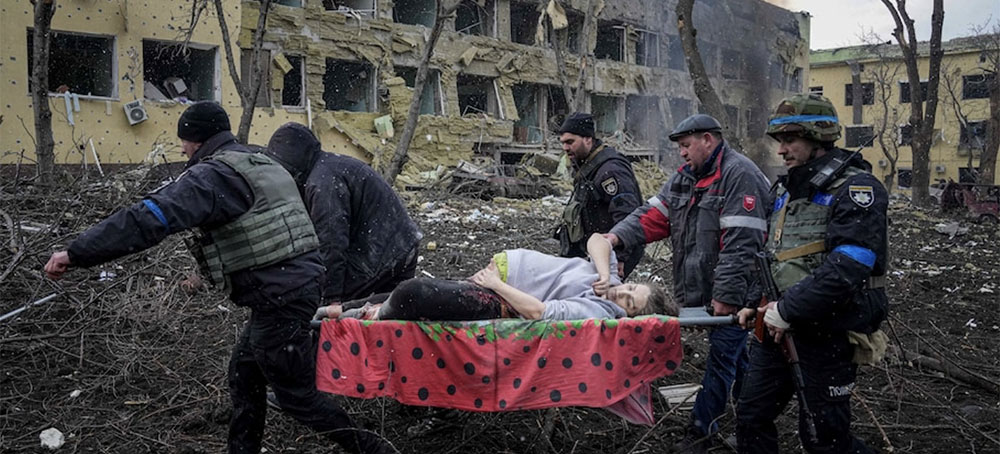 A woman is carried from the maternity hospital that was shelled in Mariupol, Ukraine, last week. (photo: Evgeniy Maloletka/AP)
A woman is carried from the maternity hospital that was shelled in Mariupol, Ukraine, last week. (photo: Evgeniy Maloletka/AP)
Pregnant Mother Whose Photo Showed Tragedy of Maternity Hospital Bombing in Ukraine Dies With Her Baby
Annabelle Timsit, The Washington Post
Timsit writes: "A pregnant woman, her face pale, lies on a stretcher. Her left hip is covered in blood as she is rushed out of a hospital in the Ukrainian city of Mariupol, which had just been hit by an airstrike."
A pregnant woman, her face pale, lies on a stretcher. Her left hip is covered in blood as she is rushed out of a hospital in the Ukrainian city of Mariupol, which had just been hit by an airstrike.
The gripping picture, captured by photographer Evgeniy Maloletka for the Associated Press, encapsulated the toll on civilians of Russia’s invasion of Ukraine. It was shared, and the strike condemned, around the world — but little was known about the woman herself.
Now, the AP reports that the woman and her baby died in horrific conditions in the aftermath of the attack on the hospital — arriving for surgery with her pelvis crushed and hip detached.
Surgeon Timur Marin told the AP that medics delivered the baby via Caesarean section but that the infant showed “no signs of life.”
Video from besieged Mariupol shows physical and emotional devastation: ‘I don’t know where to run’
The woman, whose name has not been revealed publicly, is part of a civilian death toll from the war in Ukraine that the United Nations puts at 596, although it said it “believes that the actual figures are considerably higher.”
The woman’s story illustrates the perilous situation facing those who are pregnant in Ukraine, where at least 31 attacks on health-care facilities or equipment have been documented by the World Health Organization since the start of Russia’s assault 2½ weeks ago.
According to the United Nations, “80,000 Ukrainian women are expected to give birth in the next three months while oxygen and medical supplies, including for the management of pregnancy complications, are running dangerously low.”
In Mariupol, a southern port in Ukraine that officials say has been under Russian bombardment for days, a maternity hospital was hit Wednesday. Ukrainians blamed Russian forces; Moscow has claimed without evidence that the hospital was emptied of patients and used as a base for Ukrainian military activity.
Videos and photos taken at the scene show children and injured pregnant women being led away from the hospital after the attack. Mariupol’s city council said Thursday that three people, including a child, were killed, while 17 — among them children, women and medical workers — were injured. Ukrainian President Volodymyr Zelensky called the attack an “atrocity.”
“What kind of country is this, the Russian Federation, which is afraid of hospitals and maternity hospitals and destroys them?” Zelensky said in a video address late Wednesday. Global leaders condemned the attack, with Britain’s minister for the armed forces, James Heappey, calling it a “war crime.”
Among the photos and videos that circulated in the aftermath of the attack, one featured the pregnant woman being evacuated on a stretcher amid the rubble.
She was sent to another hospital, the AP reported, drawing on testimony from medics and the surgeon who treated her. The woman reportedly told medics to “kill me now” when she realized that she was losing her baby.
The woman’s surgeon said attempts were made for “more than 30 minutes” to resuscitate her but that in the end, she and her baby “both died.” Her body was picked up from the hospital, medics told the AP, but they were not able to record the woman’s name.
Another injured pregnant woman who was captured by photographers fleeing the maternity hospital gave birth on Friday, according to AP photos. In one, Mariana Vishegirskaya, wearing the same top as when she was pictured walking down the stairs of the Mariupol hospital after the strike, holds her newborn daughter close to her chest as she lies on a hospital bed.
International organizations say the attack on the Mariupol maternity hospital was not the first.
In a joint statement published Sunday, the leaders of the WHO, the United Nations Population Fund and UNICEF demanded an end to attacks on health-care facilities or equipment.
“To attack the most vulnerable — babies, children, pregnant women, and those already suffering from illness and disease, and health workers risking their own lives to save lives — is an act of unconscionable cruelty,” their statement said.
READ MORE
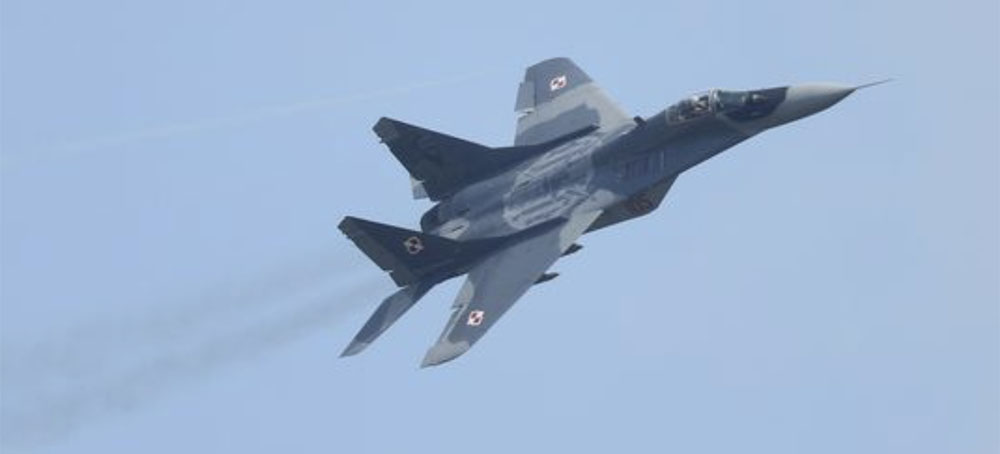 A Mikoyan MiG-29 jet fighter of the Polish Air Force in 2016. (photo: Sean Gallup/Getty Images)
A Mikoyan MiG-29 jet fighter of the Polish Air Force in 2016. (photo: Sean Gallup/Getty Images)
NATO's Polish MiG-29 Fiasco
The Wall Street Journal Editorial Board
Excerpt: "The White House divides the alliance and signals weakness to Putin by refusing to let Warsaw send fighter jets to Ukraine."
The White House divides the alliance and signals weakness to Putin by refusing to let Warsaw send fighter jets to Ukraine.
The U.S. and Europe have shown impressive cohesion since Vladimir Putin’s invasion of Ukraine, which makes this week’s fiasco over delivering Poland’s MiG fighters to Kyiv so damaging. The message to Mr. Putin is that his intimidation works and NATO can be divided.
On Tuesday Poland said it could transfer around two dozen MIG-29 jet fighters to a U.S. base in Germany, and then to Ukraine, whose pilots can fly the Soviet-era planes with minimal training. On Sunday Secretary of State Antony Blinken had said the U.S. was working with the Poles on the issue and would try to “backfill anything that they provide to the Ukrainians.” Yet Washington later claimed surprise at Poland’s proposal.
“The decision about whether to transfer Polish-owned planes to Ukraine is ultimately one for the Polish government,” said a Pentagon spokesman in a statement late Tuesday. “The prospect of fighter jets ‘at the disposal of the Government of the United States of America’ departing from a U.S. NATO base in Germany to fly into airspace that is contested with Russia over Ukraine raises serious concerns for the entire NATO alliance.” He added that the plan lacked “substantive rationale” and was not “tenable.”
Untenable how? After a NATO no-fly zone, which the alliance has refused, the MiGs are Ukrainian President Volodymyr Zelensky’s top request. The jets won’t decide the war, but his generals must think they’d help if only to deny Russia control of the skies. Any Russian artillery batteries or jets taken off the battlefield could save Ukrainian lives.
What happened between Mr. Blinken’s endorsement and the Pentagon’s rejection? It’s hard not to conclude that the White House blinked for fear of provoking Mr. Putin, who is demanding that the West stop arming Ukraine.
But NATO countries are already sending all sorts of weapons into Ukraine. Is a Polish MiG with a Ukrainian pilot somehow more provocative than a Turkish drone or an American antitank missile? Transferring planes isn’t the same as NATO aviators directly shooting down Russian jets.
Mr. Putin calls anything beyond Western acquiescence and Ukraine’s surrender a provocation. And NATO Secretary-General Jens Stoltenberg felt obliged to warn Mr. Putin Tuesday that a Russian attack on supply lines in alliance territory would trigger a collective response: “We are removing any room for miscalculation, misunderstanding about our commitment to defend every inch of NATO territory.”
Poland—which shares a border with Russia, Belarus and Ukraine—doesn’t want the transfer of planes directly to Ukraine from its territory to be perceived as a unilateral provocation. Polish Prime Minister Mateusz Morawiecki said Wednesday that the decision “must be unanimous and unequivocally taken by all of the North Atlantic Alliance.”
On Wednesday U.S. Defense Secretary Lloyd Austin formally nixed the MiG transfer to Ukraine. The failure of Team Biden to back up Warsaw is a failure of U.S. leadership.
There is risk of escalation in any war, and needless provocations should be avoided. But the risk of giving Mr. Putin a veto over NATO actions is that it undermines the credibility of deterrence. As Mr. Putin’s frustration grows, he is bombing cities, and Wednesday bombed a maternity hospital. The death toll is rising.
As he escalates, will he use chemical weapons or tactical nukes? Will NATO refuse to respond then because it fears World War III? The MiG mistake may let Mr. Putin believe his threats will make NATO stand down.
READ MORE
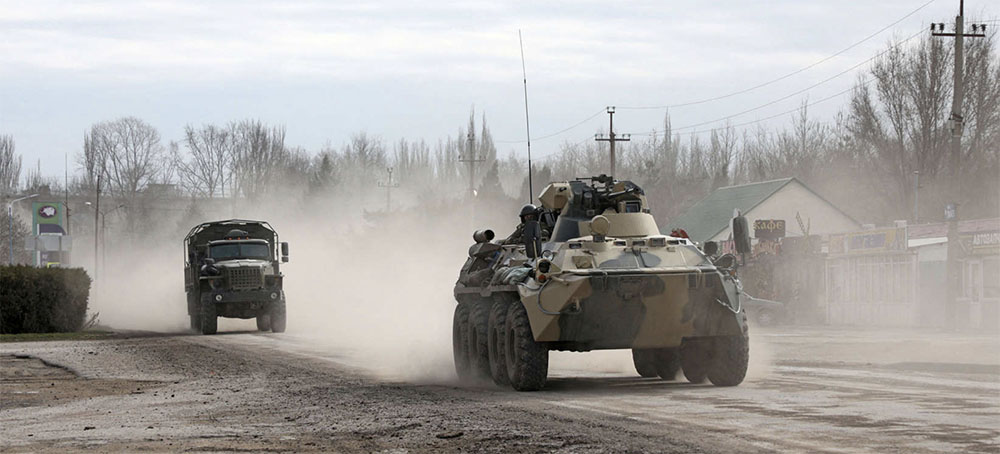 Russian Army military vehicles drive along a street in Armyansk. (photo: Stringer/Reuters)
Russian Army military vehicles drive along a street in Armyansk. (photo: Stringer/Reuters)
Report: Russia Seeks Military Equipment From China After Ukraine Invasion
Reuters
Excerpt: "Russia has asked China for military equipment since its Feb. 24 invasion of Ukraine, the Financial Times and Washington Post reported on Sunday, citing U.S. officials."
Russia has asked China for military equipment since its Feb. 24 invasion of Ukraine, the Financial Times and Washington Post reported on Sunday, citing U.S. officials.
U.S. National Security advisor Jake Sullivan will be in Rome on Monday to meet with China's top diplomat Yang Jiechi, the White House said earlier.
Russia, which calls its action in Ukraine a "special operation," and China have tightened cooperation as they have come under strong Western pressure over human rights and a raft of other issues.
Beijing has not condemned Russia's attack and does not call it an invasion, but has urged a negotiated solution.
The White House's National Security Council declined to comment.
The Washington Post said the unidentified U.S. officials did not state the kind of weaponry that had been requested or how China had responded.
READ MORE
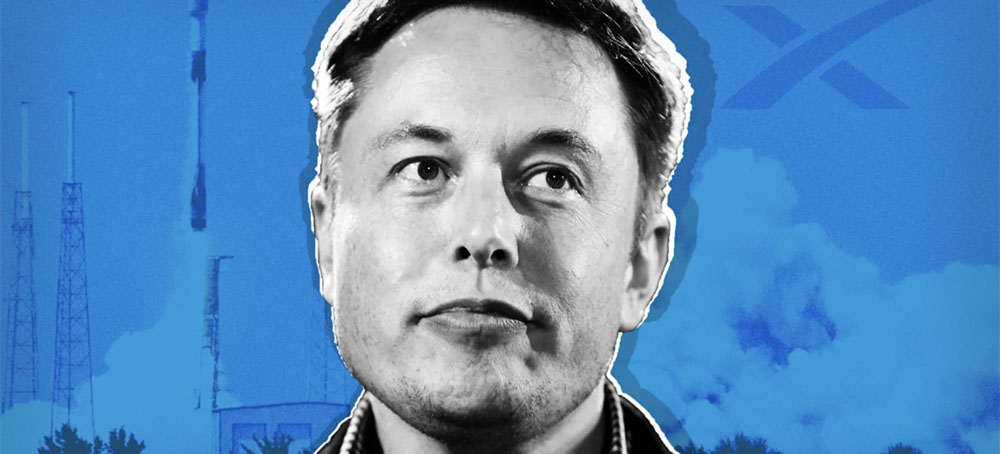 Elon Musk. (photo: Paul Hennessy/SOPA Images/LightRocket via Getty/Shutterstock/TS)
Elon Musk. (photo: Paul Hennessy/SOPA Images/LightRocket via Getty/Shutterstock/TS)
Tesla, Elon Musk Bring Power to Ukraine; Defy Russia, Putin
Daniel Kline, The Street
Kline writes: "Musk's motives may be hard to understand - sometimes it seems like he has a plan and sometimes it seems like he just wants attention - but he has made his feelings about Russia's invasion of Ukraine very clear."
Elon Musk has taken a bold stand when it comes to Russia's invasion of Ukraine.
Tesla (TSLA) - Get Tesla Inc Report CEO Elon Musk sometimes appears to vacillate between mad genius, impish prankster, and Batman villain. He's a talk first, think about the consequences later Twitter (TWTR) - Get Twitter, Inc. Report presence who has never hesitated to troll people or post things designed to provoke President Joe Biden, the SEC, or anyone else.
Musk's motives may be hard to understand -- sometimes it seems like he has a plan and sometimes it seems like he just wants attention -- but he has made his feelings about Russia's invasion of Ukraine very clear. The outspoken CEO has not only used his social media platform to speak out on behalf of the people of Ukraine, he has also supported them in more tangible ways.
Musk has sent multiple shipments on Starlink internet stations to help Ukrainians stay in touch with the world. He has also quietly sent some Tesla Powerwalls to Ukraine to help the war-torn country.
Tesla Brings Power to Ukraine's People
While many companies have made donations in Ukraine, Musk's Tesla has gone above and beyond. It has not only sent its solar-power battery systems to the country, it has also quietly shared a video on how to use them, according to one media report.
"The unlisted YouTube "Mobile Powerwall setup" video discovered by Electrek appears to have been made by Tesla, or at least by someone working alongside the electric automaker. Regardless of the official source, the video should prove very helpful to Ukraine amid these dark times," InsideEVs reported.
A Tesla Powerwall could potentially power a Starlink internet terminal for multiple days. If you add solar panels -- and Tesla provided the hookups to do that -- you could have long-term internet connectivity as well as power.
Musk Has Made His Position Very Clear
While a lot of companies -- pretty much every major American brand -- had suspended operations in Russia, most have done so quietly. McDonald's (MCD) - Get McDonald's Corporation Report, for example, has "suspended" its operations in the country, but that's a move that will reportedly cost the company $50 million a month.
So, while McDonald's and others have taken steps to not be supporting Russian President Vladimir Putin, they have been much more measured than Musk in their approach. Yes, they're not doing business in Russia (for now) but they're playing politician and setting themselves up to return as soon as possible.
Musk has not done that and has cast his support very directly to the people of Ukraine through direct action and by using his very powerful social media voice.
The CEO, however, has also made it clear that he sees this situation as a Putin problem and not something to hold the people of Russia responsible for.
Musk may sometimes come off as unfeeling or at least unthinking when it comes to his social media presence. In this case, he has taken bold action and made real moves on behalf of Ukraine. That's perhaps not unique among CEOs, but it's very rare in a world where global companies always keep an eye on their long-term bottom line even while doing the right thing during a global conflict.
READ MORE
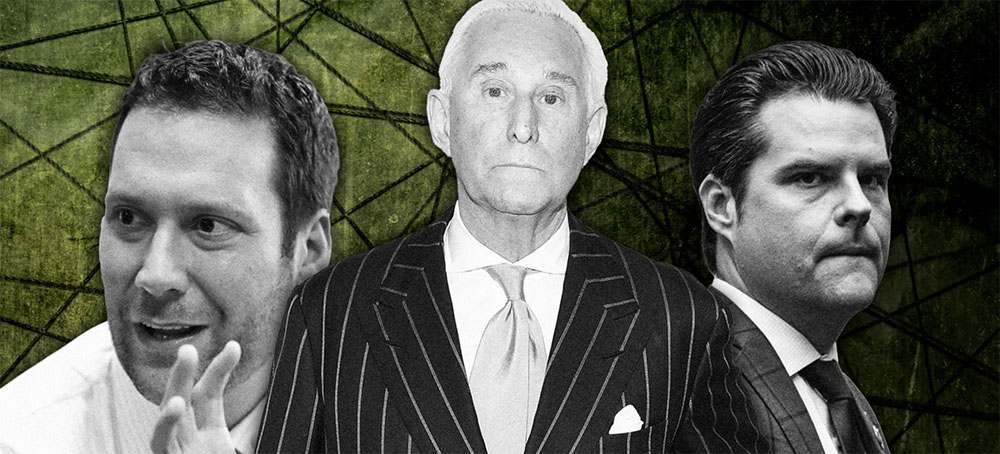 Roger Stone with Gaetz and Greenberg. (photo: Thomas Levinson/The Daily Beast/Getty Images)
Roger Stone with Gaetz and Greenberg. (photo: Thomas Levinson/The Daily Beast/Getty Images)
Roger Stone Has Been Playing All Sides of the Gaetz Scandal
Roger Sollenberger, The Daily Beast
Sollenberger writes: "One of the most connected players in MAGA world just happened to advocate for pardons for three men tied to the Matt Gaetz sex investigation - and they're not on the same side."
One of the most connected players in MAGA world just happened to advocate for pardons for three men tied to the Matt Gaetz sex investigation—and they’re not on the same side.
Months before the public knew about the federal sex crimes investigation into Rep. Matt Gaetz, the man seemingly at the middle of everything in MAGA world—Roger Stone—was already in deep.
How deep? Enough, in classic Roger Stone fashion, to play all sides.
Stone has long been close not only with Gaetz, but also with Joel Greenberg, the congressman’s former best friend and “wingman,” who last year pleaded guilty to sex trafficking the same minor at the center of the Gaetz investigation.
But Stone also has unreported ties to a third Florida man in the saga. And, what’s more, he lobbied for pardons for all three men.
While there’s still no definitive accounting for Stone’s motivations, new documents and sources provide a clue—a seemingly improbable connection, involving one of the most bizarre chapters in an already bizarre scandal.
It’s already known that Stone lobbied for pardons for both Gaetz and Greenberg in the waning days of the Trump administration. But it wasn’t known that Stone also advocated for a pardon for this third man connected to Gaetz and Greenberg: Stephen Alford, a serial fraudster from the Florida panhandle.
That development was first revealed by The Washington Post in a draft memo published earlier this month. But the Post report didn’t mention Alford—his name only appears in a document the Post obtained and uploaded online—and the link hasn’t been explored.
Two months after Stone advocated for Alford’s absolution, that allegiance dissolved when Alford became Gaetz’s scapegoat for the investigation. (Stone also eventually blasted Alford as part of the “deep state.”)
Just weeks before, however, Stone was in Alford’s corner, lobbying for a pardon.
According to the Post, the veteran GOP operative wrote a draft memo to then-President Donald Trump—called the “Stone Plan”—after the Jan. 6 Capitol riots.
In the memo, Stone asked Trump to pardon a number of associates, elected officials, and MAGA luminaries, including Gaetz, who Stone said merited a preemptive pardon for trying to overturn the election.
The “Stone Plan” also confirms The Daily Beast’s reporting last spring that Stone advocated for a pardon for Greenberg. At the time, Stone denied pushing for a Greenberg pardon, claiming he “made no formal or informal effort in regard to a pardon for Mr. Greenberg,” and had declined Greenberg’s offer to “retain” him.
But what makes the Stone list of potential pardon recipients even more notable is the last name.
Right after Greenberg comes Stephen Michael Alford. Stone then adds, “I have no ‘clients’—these are just people I know have busted their ass to help you get elected President.”
While it’s unclear how Alford is connected to Stone—or how Alford is connected to Trump—he does have quite the record.
In the 2000s, Alford was convicted in Florida for fraud and grand theft in excess of $100,000. In 2015, he was indicted on a $6 million fraud and extortion scheme, and two years later was sentenced to five years in prison. He was released in March 2019 on 10 years probation, according to records with the Florida Department of Corrections, and those convictions would appear the likely subject of his pardon request.
Still, one of the biggest mysteries of Stone’s involvement with the Gaetz and Greenberg drama is now what Stone’s connection to Alford may be.
Alford isn’t wealthy, and there’s no public record of him “busting his ass” to elect Trump. Alford never even donated to the campaign. He hasn’t made any listed contributions at all since 2004, when he and his three children all maxed out on the same day to Republican House candidate Bev Kilmer, per federal records.
According to a person with direct knowledge of the events, however, Alford had one powerful friend: A Republican lobbyist close to Stone.
Weeks after Alford’s pardon request was declined, that lobbyist shared some more information: Matt Gaetz was in trouble. And the lobbyist, this person said, had the details, including images of Gaetz with young women at a sex party.
While it’s unclear how the lobbyist—an associate of Oleg Deripaska—came into this information, Stone had by that time known about the Gaetz allegations for months; Greenberg had told Stone all about their involvement with a 17-year-old, both over text messages and in a confession he drafted at Stone’s request, as part of the pardon process.
It didn’t take long for Alford to cobble together a plan—and it was a doozy: He would secure Gaetz a presidential pardon in exchange for $25 million, which Alford would supposedly use to repatriate an FBI agent taken hostage in Iran who has long been considered dead.
Alford and an associate pitched the Gaetz family on the deal. They gave Gaetz’s father a letter claiming that his son was soon to be indicted for sex crimes and had been photographed at orgies, offering a $25 million exit ramp.
That plan eventually landed Alford back in prison. But first, Gaetz and Stone saw an opportunity.
When The New York Times broke the investigation in late March last year, Gaetz used Alford’s ploy as ammo. He fired off a tweetstorm, claiming the Times report was a “planted leak” designed to torpedo an investigation into “criminal extortion” plot “to smear my name.”
The central figure in Gaetz’s narrative, however, wasn’t Alford; it was Alford’s lawyer, whose role was limited to holding the money in an escrow account while Alford negotiated the release.
That lawyer had one special characteristic: Three decades ago, he served as a DOJ prosecutor. And that fact equipped the narrative with a “deep state” hook—a Roger Stone special.
Gaetz doubled down that night on Tucker Carlson’s late-night Fox News talk show, explaining the convoluted “leaking” and “smearing” plot to a befuddled Carlson, who remarked that it was “one of the weirdest interviews I’ve ever conducted.”
The next day, Stone piped up to defend Gaetz, using the same language.
“The ‘leaked’ smear on Congressman Matt Gaetz is an extortion play and an effort to destroy the up and coming conservative leader who has the balls to call the left out,” Stone wrote in a social media post, the Sun-Sentinel reported. He repeated the refrain for weeks.
But that effort to “destroy” an outspoken conservative threat to the left was actually the work of a man Stone himself had just argued was deserving of presidential clemency—based on his fealty to the MAGA cause.
And it was right around this time that the Gaetz campaign started paying Stone.
On March 24, the committee paid Stone’s firm $5,000 for “strategic campaign consulting,” according to federal records. Days later, Gaetz’s father met with Alford’s lawyer, wearing a wire.
The campaign continued to pay Stone $5,000 a month, and Stone continued to accept it, despite what Greenberg had told him months prior. The payments stopped in May, however, not long after Gaetz hired two high-profile out-of-state criminal defense attorneys, and Stone went dark.
Lawyers for Alford, Greenberg, and Stone all declined to comment for this article.
A Gaetz spokesperson reiterated that the campaign knew Alford was working with the two other people in the Iranian hostage plan. (Neither of them has been charged with a crime.)
“Who else he was working with, including Roger Stone, is news to us,” the spokesperson said.
While the Gaetz spokesperson said they weren’t aware of Alford’s ties to Stone, they did not answer when asked whether Gaetz and Stone had ever discussed Alford, and if so, when. They also did not say when things went south with Stone.
But if it wasn’t clear how Stone felt after the campaign payments stopped, in January he pulled back the veil, skewering Gaetz after reports revealed that an ex-girlfriend had testified to the grand jury under an immunity deal.
“Bye Matt! Bye Bye,” Stone posted on social media, linking to a report about the testimony.
That signaled a major break in a longtime friendship. Gaetz and Stone go way back—with Greenberg rounding out a famous photo taken in July 2017.
Months later, the trio attended a pro-cannabis conference, where Gaetz claimed Stone had “drafted” him in “2013 or 2014” to help roll back cannabis regulations. Stone also appeared at a Gaetz fundraiser after the conference, and that same day, Greenberg used Venmo to send $500 to a woman Gaetz has allegedly paid for sex, as The Daily Beast previously reported.
And Greenberg continued to hew closely to Stone’s orbit.
According to the Times, Greenberg—who held elected office as Seminole County tax collector—got political firepower from a website run by a member of the Stone-adjacent Proud Boys neo-fascist group.
In 2020, just before Greenberg’s first indictment, fake social media accounts linked to Stone pushed false smears about Greenberg’s political challengers, the Times reported.
“Watch out Seminole county,” one account posted, adding “don’t open your door” to Greenberg’s opponent, who Greenberg had falsely smeared as a pedophile—a crime to which he would later plead guilty.
The post linked to an article on a website run by a Stone associate Greenberg had previously paid to write favorable articles, according to payments obtained by The Daily Beast. Three days after that post went up, Greenberg was indicted.
Today, Greenberg sits in federal prison. So does Alford, on fraud charges. Stone is fighting a $2 million federal tax evasion lawsuit while under investigation for his role in the Jan. 6 attack on the U.S. Capitol.
The Gaetz investigation is ongoing.
READ MORE
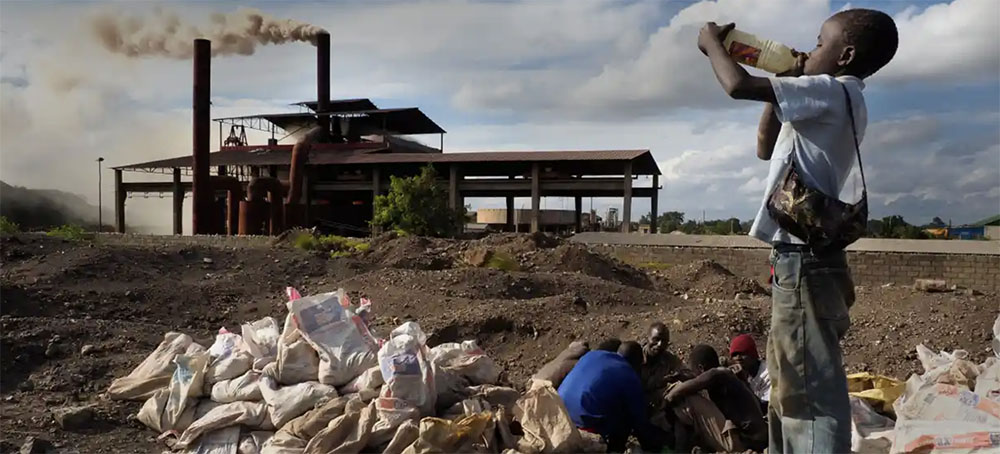 Kabwe in Zambia, one of the toxic 'sacrifice zones' cited by the UN, where 95% of children have elevated levels of lead in their blood. (photo: Larry C Price/Larry C. Price)
Kabwe in Zambia, one of the toxic 'sacrifice zones' cited by the UN, where 95% of children have elevated levels of lead in their blood. (photo: Larry C Price/Larry C. Price)
Millions Suffering in Deadly Pollution 'Sacrifice Zones,' Warns UN Expert
Damien Gayle, Guardian UK
Gayle writes: "A UN expert has warned of the creation of pollution 'sacrifice zones' across the world, where tens of millions of people are suffering strokes, cancers, respiratory problems and heart disease as a result of toxic contamination of the environment."
Businesses blamed for rise of toxic hotspots hitting poor communities hardest
A UN expert has warned of the creation of pollution “sacrifice zones” across the world, where tens of millions of people are suffering strokes, cancers, respiratory problems and heart disease as a result of toxic contamination of the environment.
“There are sacrifice zones all over the world, in every region: in the north, in the south, in the east, in the west, in rich countries, in poor countries,” David Boyd told the Guardian.
Boyd, the special rapporteur on human rights and the environment, cited physical health issues, including cancer, heart disease, respiratory illness, strokes and reproductive health problems, as well as “incredible mental health problems associated with living in these places because people feel exploited, they feel stigmatised”.
All of this infringed their human rights, Boyd said. “Their rights to life, their rights to health, and … their right to a clean, healthy and sustainable environment. You cannot reconcile that fundamental right to a healthy environment with these absolutely horrific environmental conditions.”
In a report due to be presented to the UN human rights council on Thursday, Boyd says pollution contributed to twice as many premature deaths as Covid-19 in the first 18 months of the coronavirus pandemic.
Giving the death toll from pollution in that period is a staggering 9 million, the report adds: “One in six deaths in the world involves diseases caused by pollution, three times more than deaths from Aids, malaria and tuberculosis combined and 15 times more than from all wars, murders and other forms of violence.
“The toxification of planet Earth is intensifying,” Boyd’s report warns, pointing out that even as some harmful chemicals are banned or abandoned, overall production of chemicals doubled between 2000 and 2017, and will double again by 2030.
And while everyone was affected to some degree, some communities were being hit far more than others. “If you look at these places that I’ve highlighted in the report, pollution on our planet today is pervasive, it’s affecting everyone but it’s affecting some people in a really grossly unfair and disproportionate way,” Boyd told the Guardian.
“The United States, one of the wealthiest countries in the world, one of the wealthiest countries in all of human history, is home to one of the worst sacrifice zones on the planet. This place, it’s called ‘cancer alley’, in Louisiana, where there are more than a hundred oil refineries, petrochemical plants, etc,” he said.
“And guess where they’re located? In poor, predominantly black communities. It’s just, as I said, it’s unconscionable.”
Other sacrifice zones included:
Kabwe, Zambia, where 95% of children had elevated levels of lead in their blood, putting them at risk of lifelong intellectual impairment,
The Pata Rât landfill in Romania, where thousands of Roma people live and are exposed to arsenic, lead, mercury and other pollutants.
The French overseas territories of Guadeloupe and Martinique, in the Caribbean, where 90% of people were found to have the carcinogenic pesticide chlordecone in their blood.
Businesses were the main culprit, with most happy to overlook social and environmental costs in favour of their bottom line, Boyd said, adding that money was “the main barrier to addressing the climate crisis, to addressing biodiversity loss and to addressing pervasive pollution”. He called on governments to impose strong regulation on corporations causing pollution – and to stop spending an estimated $1.8tn a year on subsidies for environmentally damaging industries.
“[Oil and gas companies are] not going to voluntarily stop producing oil and gas; big coal companies are not going to voluntarily shift from being big coal companies to being big solar and wind companies: governments have to do that, that’s their job, it’s governments that have the obligations to respect, protect and fulfil our human rights,” Boyd said.
But there was cause for optimism, he said. Boyd’s report comes six months after the human rights council recognised for the first time that everyone had a human right to live in a clean, healthy and sustainable environment.
“And this is really a key point,” he said. Previous agreements on biodiversity, climate change and pollution were formerly unenforceable. “But guess what: when you weld the international environmental agreements together with human rights law, human rights law brings into the equation institutions, processes, accountability.
“That’s what’s really exciting about this UN recognition of a right to a clean, healthy and sustainable environment – it signals this union of human rights law and environmental law which can be an extremely powerful catalyst of the kinds of transformative changes that we so desperately need.”
READ MORE
Contribute to RSN
Follow us on facebook and twitter!
Update My Monthly Donation
PO Box 2043 / Citrus Heights, CA 95611








